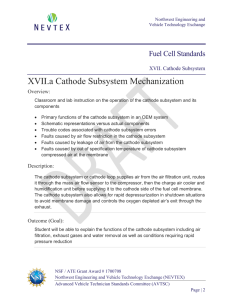Fuel Cell Standards: Fuel Cell Cathode Subsystems

Fuel Cell Standards Curriculum Description:
The Fuel Cell Standards curriculum is provided by the Northwest Engineering and Vehicle Exchange (NEVTEX) and developed by Central Oregon Community College (COCC) and Rio Hondo College (RHC). COCC and RHC worked together "to develop curriculum and training standards for technicians in hybrid electric vehicle (HEV), electric vehicle (EV), and Fuel Cell (FC) vehicle systems." This curriculum was developed with the intention of addressing industry needs by partnering with industrial and educational representatives to obtain input and assistance to develop:
- new approaches to prepare an advanced technologies workforce,
- licensure procedures and policies to ensure the safety of technicians, their employers, and clients, and
- collaboration between educational and industrial partners in the development of new standards and practices.
These standards fulfill an SAE Fuel Cell Systems Certification, which prepares students for interfacing with both high voltage electrical and high-pressure hydrogen systems. The Fuel Cell Standards are broken into seven topics. This section contains the topic Fuel Cell Cathode Subsystems. The other six topics and an Acronym and Definition list are available to view separately.
Fuel Cell Cathode Subsystems Description and Contents:
This section of the standards includes the following documents:
- XVIIa Cathode Subsystem Mechanization: This document provides education standards for the operation of the cathode subsystem and its components. The standard also covers air filtration, exhaust gases, and water removal, as well as conditions requiring rapid pressure reduction.
- XVIIb Air Filtration: This document provides education standards for the functions, service, and testing of air filtration systems.
- XVIIc Mass Airflow Sensor: This document provides education standards for the functions and operating parameters of mass airflow sensors (MAS).
- XVIId Compressors and Turbo Machines: This document provides education standards for explaining the different types of compressors, the functions of the compressor system, potential faults, and troubleshooting compressor issues.
- XVIIe Charge Air Cooler: This document provides education standards for the functions of the charge air cooler.
- XVIIf Air Flow Values: This document provides education standards for the functions and faults of the air flow valves.
- XVIIg Exhaust System: This document provides education standards for the functions and basic components of the exhaust system.
- XVIIh Pressure Temperature and Humidity Sensors: This document provides education standards for the functions and operating parameters of pressure temperature and humidity sensors.
- XVIIi Humidification Unit: This document provides education standards for the functions of the humidification system and different methodologies for achieving humidification within the fuel cell stacks' requirements.
About this Resource


Comments